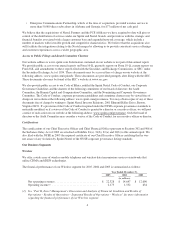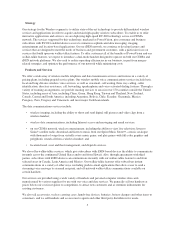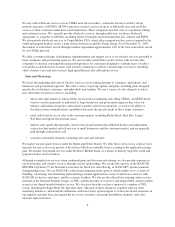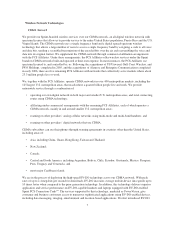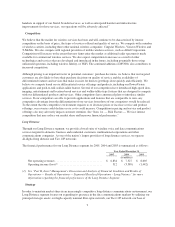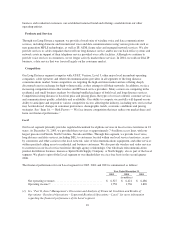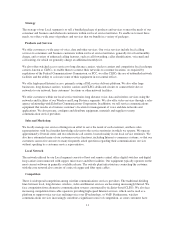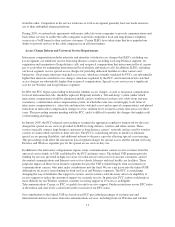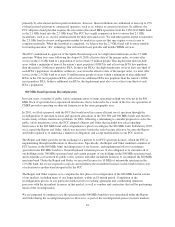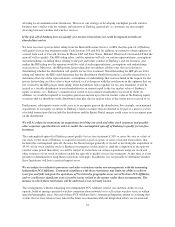Sprint - Nextel 2005 Annual Report Download - page 25
Download and view the complete annual report
Please find page 25 of the 2005 Sprint - Nextel annual report below. You can navigate through the pages in the report by either clicking on the pages listed below, or by using the keyword search tool below to find specific information within the annual report.segments. The FCC is considering changing the interstate revenue-based assessment in whole or in part with an
assessment based on telephone numbers or connections to the public network.
Voice over Internet Protocol
With the increasing availability of VoIP services, the FCC has and continues to consider the regulatory status of
various forms of VoIP. In 2004, the FCC issued an order finding that one form of VoIP, involving a specific form
of computer-to-computer services for which no charge is assessed and conventional telephone numbers are not
used, is an unregulated “information service,” rather than a telecommunications service, and preempted state
regulation of this service. The FCC also ruled that long distance offerings in which calls begin and end on the
ordinary public switched telephone network, but are transmitted in part through the use of IP, are
“telecommunications services,” thereby rendering the services subject to all the regulatory obligations imposed
on ordinary long distance services, including payment of access charges and contributions to universal service
funds. In addition, the FCC preempted states from exercising entry and related economic regulation of VolP
services that do not use conventional phone numbers and that originate through the use of broadband connections
and specialized customer premises equipment. However, this ruling, which has been appealed in the courts, did
not address specifically whether this form of VoIP is an “information service” or a “telecommunications
service,” or what regulatory obligations, such as intercarrier compensation and USF contributions, should apply.
These issues surrounding how retail VoIP offerings should be regulated (if at all), including whether they should
pay access charges and/or contribute to the federal USF, remain pending. The FCC requires certain VoIP
providers to offer enhanced 911, or E911, emergency calling capabilities to their subscribers.
High-speed Internet Access Services
Following a June 2005 U.S. Supreme Court decision affirming the FCC’s classification of cable modem Internet
access service as an “information service” and declining to impose mandatory common carrier regulation on
cable providers, the FCC issued an order in September 2005 declaring the high-speed Internet access services,
which are provided by ILECs, including our Local segment, are “information services” rather than
“telecommunications services.” As a result, over time ILECs will be relieved of the obligations to provide the
underlying broadband transmission to other Internet service providers. A decision on whether all high-speed
Internet access services, regardless of the technology used, are subject to various FCC consumer protection
regulations is pending, and the imposition of any such obligations could result in significant costs to us.
Wireless Operations
The FCC regulates the licensing, construction, operation, acquisition and sale of our business and wireless
spectrum holdings. FCC requirements impose operating and other restrictions on our business that increase our
costs. The FCC does not currently regulate rates for services offered by CMRS providers, and states are legally
preempted from regulating such rates and entry into any market. The Communications Act and FCC rules also
require the FCC’s prior approval of the assignment or transfer of control of an FCC license, although the FCC’s
rules permit spectrum lease arrangements for a range of wireless radio service licenses, including our licenses,
with FCC oversight. Approval from the Federal Trade Commission and the Department of Justice, as well as
state or local regulatory authorities, also may be required if we sell or acquire spectrum interests. The FCC sets
rules, regulations and policies to, among other things:
• grant licenses in the 800 megahertz, or MHz, band, 900 MHz band, 1.9 gigahertz, or GHz, PCS band, and
2.5 GHz Broadband Radio Service, or BRS, and Educational Broadband Service, or EBS, bands, and
license renewals,
• rule on assignments and transfers of control of FCC licenses, and leases covering our use of FCC licensees
held by other persons and organizations,
• govern the interconnection of our iDEN and CDMA networks with other wireless and wireline carriers,
14


